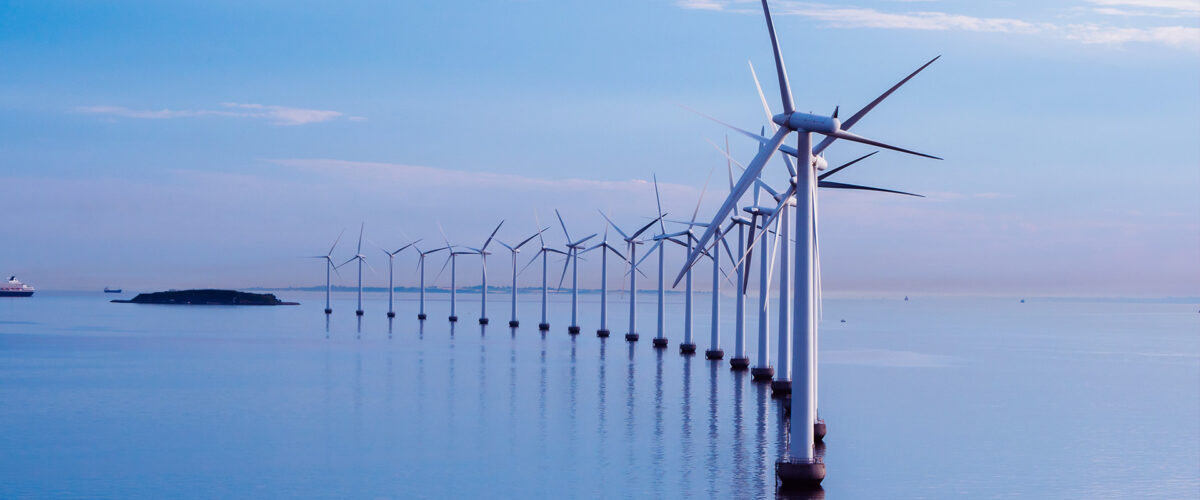Article | 18 May 2022
Overlapping permit applications for offshore wind farms in the Swedish economic zone

As interest in the establishment of offshore wind farms has increased, attention has been drawn to the problem of overlapping permit applications for offshore wind farms within the Swedish Economic Zone (SEZ). In view of the lack of a legal rule prescribing who should be granted the exclusive right to establish a wind farm in an application area within the SEZ, the Government has decided to commission the Swedish Agency for Marine and Water Management to investigate the issue. In this article Tove Skärblom and Ellen Lewin presents various solutions that may be considered to deal with overlapping permit applications.
By 2050, the EU must be climate neutral. Offshore wind farms can play an important role in achieving this goal. The establishment of offshore wind farms is governed by several laws and regulations. Which laws or regulations that are relevant depends, inter alia, on the location of the proposed wind farm, i.e. whether the farm is planned within Sweden’s territorial waters, which extend 12 nautical miles (about 22 km) from the baseline, or within Sweden’s economic zone (SEZ), which reaches 200 nautical miles (about 360) km from the baseline.
Establishment within the SEZ requires a fourfold environmental assessment under the Swedish Economic Zone Act (1992:1140) (“SEZ Act”), the Continental Shelf Act (1966:314), the Electricity Act (1997:857) and Chapter 11 of the Environmental Code. In addition, a Natura 2000 permit may be a condition for granting a SEZ permit. Additional permits and decisions may also be required, such as permits regarding right-of-use of water areas and permits to survey the sea.
With the increased interest in the establishment of offshore wind farms, the issue of overlapping permit applications within the SEZ has been highlighted. Overlapping permit applications mean that several operators have applied to construct an offshore wind farm, in whole or in part in the same area. The problem has raised the question of who should be granted exclusive rights to the area applied for.
It is the government that issues a SEZ permit. There is currently no legal rule governing how overlapping permit applications should be handled. To solve this, the government presented a wind farms package on 6 April 2022, in which the Swedish Agency for Marine and Water Management was given a government commission to investigate competing offshore wind farms. The Agency will thus examine how operators should be granted exclusive rights to establish offshore wind farms in specific areas. The Government’s mandate is to be reported on by 30 November 2022.
There are various possible solutions for dealing with the overlapping permit applications. One way is for the government to decide to apply the so-called early bird principle, i.e. to decide on permit applications in the order in which they are received. Another way is to decide that the overlapping permit applications will be handled jointly. Such an approach would mean that the application which is most appropriate from a public interest point of view would receive the permit or that the overlapping area would be divided between the applicants.
The Government’s decision to apply the early bird principle would be based on the equity perspective, whereby the first applicant to submit an application that meets the requirements of the applicable laws and regulations will receive the permit. Such an arrangement is provided in, for example, the Mining Act (1991:45), see Chapter 2 Section 3.
The reason why the government would not decide on the early bird principle in case of overlapping permit applications may be the purpose of the SEZ Act. The Act is based on the 1982 Convention on the Law of the Sea, which gives a coastal state a sovereign right to explore for and extract, conserve and manage living and non-living natural resources in the water column (Sw. vattenpelaren) and on the seabed and in the strata beneath it. The law also provides an exclusive right to engage in other activities for the economic processing and exploration of the zone, such as wind energy production. A coastal state thus has an exclusive right to access the resources of the SEZ, but also an obligation to manage them.
A comparison can be made here with land-based wind farms, which may seem to be based on an early bird principle, as an operator has the possibility to “claim” land for the establishment of a wind farm by entering into lease agreements that give an exclusive right to an area. It is questionable whether such an arrangement can be considered compatible with the economic interest on which the SEZ Act is based. The purpose of the SEZ Act may therefore provide an argument in favour of the government deciding that overlapping permit applications should be dealt with jointly and compared in order to identify the most suitable wind farm from an economic and public interest perspective.
A further solution would be for the Government to decide on an analogous application of Chapter 16 Section 11 of the Environmental Code. According to this provision, a joint examination of cases and matters must be carried out. If the activities affect the same natural resource or cannot be carried out alongside each other for some other reason, the activities must, if possible, be reconciled so that they can be carried out without significant disadvantage to either of them. If such a balance is not possible, preference shall be given to the activity which is most consistent with the basic provisions for the management of land and water areas in Chapter 3 of the Environmental Code. If the government decides on a joint processing of the applications, the time aspect between the submitted applications for their joint processing is an additional issue.
In addition, one question that remains unanswered is the impact of the Services Directive (Directive 2006/123/EC on services in the internal market). Under the Services Directive, certain permit procedures must be conducted in a way that “guarantees full impartiality and transparency”.
Setterwalls is following the developments regarding the handling of overlapping permit applications for offshore wind farms with interest. You are welcome to contact us for advice on permit issues related to renewable energy or other issues related to the energy market.


